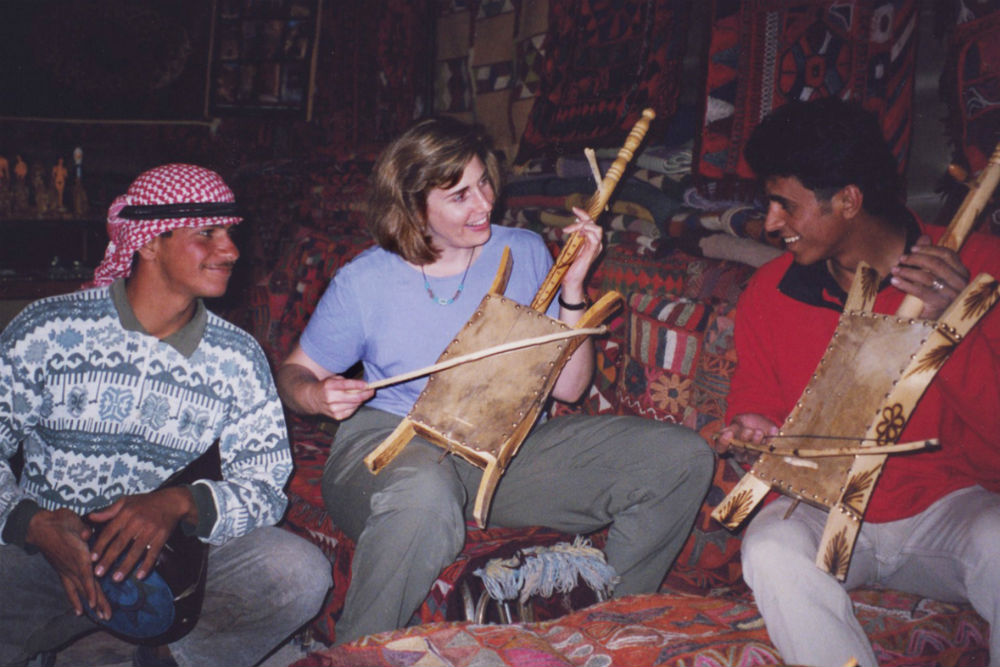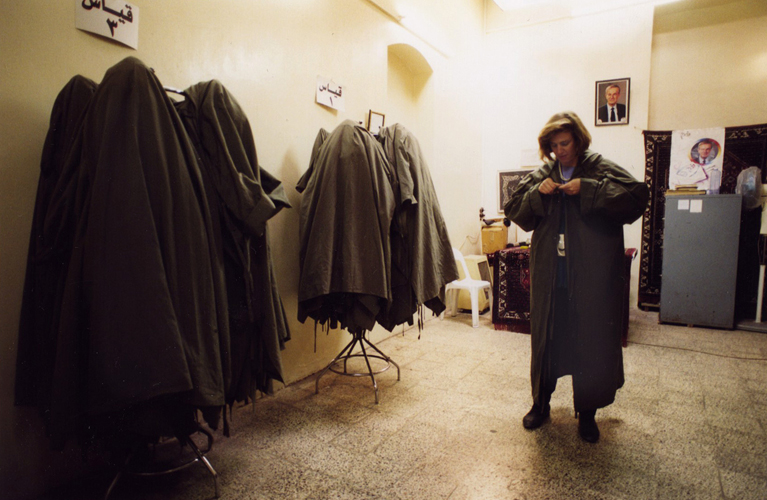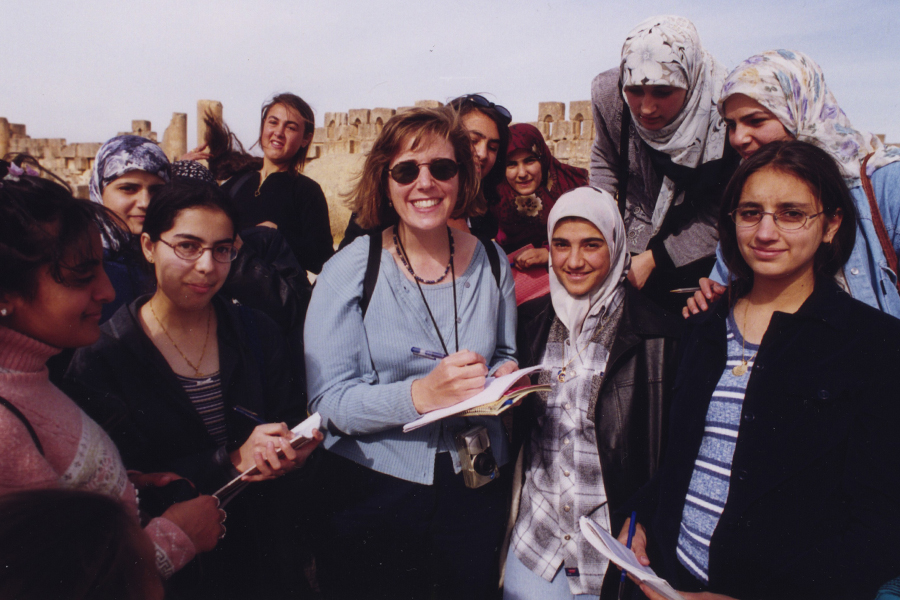Traveling in an Uncertain World: Essential Tips for Smart Travelers
 Wendy making friends in Jordan a few years back.
Wendy making friends in Jordan a few years back. Some Americans tell me they’re nervous about traveling right now. Given the recent ban blocking travel to the U.S. from seven Muslim-majority countries, and whatever unpredictable new rules might suddenly get implemented tomorrow, they’re worried that if they leave the U.S., they could have trouble getting back in. Some people are concerned about possible hassles with immigration officials in foreign airports. And, given the new administration’s “America First” attitude, some people fear anti-American sentiment at their destination.
I don’t. That’s because I’ve traveled in many countries at times when the U.S. government was disliked—and, time after time, I’ve found that, as long as you don’t behave like an “ugly American,” people don’t judge you based on your government. That’s because they don’t want you to judge them based on their government. Many people are accustomed to living under a regime that curtails their freedom and the press. If you’re sensitive and sympathetic, and as intrigued by them as they are by you, what you get is not hostility but a bonding experience.
Even in the Middle East during the Persian Gulf War and the Iraq War, I never encountered any hostility from the locals I met. In fact, I always got a warm welcome because people were so intrigued and curious to talk to an American. In the Middle East, I’ve always found people to be astonishingly friendly, warm, and hospitable. As just one example, I remember a policeman in Damascus, Syria, approaching me with a look of concern and an outreached arm, only to pick up my suitcase like a true gentleman and carry it across the street for me.
It’s my firm belief that, right now, travel is more important than ever. That’s not just because travel is fatal to ignorance about other cultures and peoples. It’s because we frequent travelers can help rectify misperceptions that the world may have right now about the United States. It’s important that other countries see that Americans are open to different cultures. It’s important that they meet Americans who don’t necessarily subscribe to the motto “America First” but are, instead, global citizens first.
Here are a few things travelers can do to convey this message and avoid the “ugly American” stereotype. These are easy ways to blend in, avoid offense, bond with locals, and stay safe. These rules of etiquette have long been the case; they’re not new to this or any presidential administration.
Avoid logos and labels.
Don’t wear T-shirts, hats, or anything with words or symbols on them. Don’t wave a U.S. flag. Don’t wear religious jewelry (no Christian cross or Star of David.) Don’t wear a red baseball cap that says “USA” or “Make America Great Again.”
Wear simple, plain, neutral clothing.
Forgo bold colors in favor of earth tones. Wear old black or brown shoes, not shiny new white sneakers (they scream “tourist”). Instead of shopping for new clothes before a trip, leave space in your suitcase to buy clothes once you arrive. That way, you gain the experience of shopping like a local, you blend in, and you come away with great souvenirs.
Speak softly and respectfully.
“Ugly Americans” speak loudly and draw attention to themselves. Remember that, when you travel, you’re like a guest in someone else’s house. Speak to the people of your host country with respect.
Steer clear of crowds.
This is not just for your safety but because crowds usually make both travelers and locals cranky, and crowds in different countries have different etiquette. Bypass political demonstrations and rallies. When practical, avoid rush hour on public transportation. Go against the normal flow of tourist traffic.
If there’s someone you’d like to photograph, establish a rapport first.
Here’s Photo Etiquette: How to Take Pictures of People When You Travel. Remember that it’s often against the law to photograph government buildings, military installations, policemen, guards, and parts of airports and train stations.
Know the country’s rules and customs.
Here are 25 Fascinating Rules of Etiquette From Around the World.
Ask questions that show that you care and can relate.
Good conversation topics—to ask locals you meet—include: How has technology changed your life? (Has it made it better? How has it impacted your work and your family? Do you feel more connected to the world at large?) What are your biggest stresses and challenges? (The cost of medical care? housing? schooling?) What happens when there’s a new baby in the family? If the mother works, how is this dealt with in the workplace? (Different cultures have very different maternity customs and laws.) How do you care for the oldest members of your family? (Many countries worldwide have more and more elderly people and not enough young people to care for them.) If you were to plan a trip to America, where would you go? What are the things you would most like to see? Such questions will establish similarities, as well as interesting differences, between your life and that of the people you meet.
Hire a stellar local guide.
A private English-speaking guide, arranged via your hotel concierge or a reputable tour company, can keep you out of trouble and introduce you to receptive local people. Remember, it’s in a guide’s best interest to keep you safe and happy. When a trip is arranged by one of my Trusted Travel Experts, you automatically tap into a network of guides and insiders at your destination who will watch out for you and can arrange for you to exchange ideas with the right local people without fear. These TTEs have their ears to the ground and know how to keep you safe and solve any problem that arises.
Get a new passport if that will give you peace of mind.
If your current passport has a stamp from Iran or another country that’s named in a ban, consider getting a new one, to avoid potential hassles coming and going.
Stay calm and relaxed, knowing you have a safety net.
Being on edge won’t win you any friends. A MedjetAssist Horizon membership can take the edge off because it provides help in an emergency, should a crisis—a political threat, a terrorist attack, violent crime, or the like—strike. It gives you access to a 24/7 Crisis Response Center, a veteran security expert to advise you, and response services to come to the rescue if necessary. Even if no major security incident has been declared yet and you’re just feeling uncomfortable and want to get out of a place, MedjetAssist will help. Full disclosure: Medjet is a sponsor of this site—but they’re a sponsor specifically because I believe in and use their service. Here are 15 other simple steps you can take to be prepared for an emergency when you travel.
Do you have tips to add? Share your thoughts below.
Be a smarter traveler: Use Wendy’s WOW List to plan your next trip. You can also follow her on Facebook and Twitter @wendyperrin, and sign up for her weekly newsletter to stay in the know.











